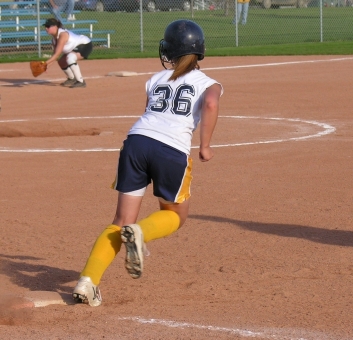The competition for rosters spots on fall sports teams seems to be more ferocious than ever. Tryouts pose a particular challenge to young athletes still playing on all-star, elite or travel sports teams this summer. Here are some tips for parents on how they can help their child perform at their best during tryouts:
- Make sure the child's pre-participation physical evaluation (PPE) is up-to-date. Not only are PPEs important in identifying physical conditions effecting sports participation, such as asthma or a history of concussions, but a signed, up-to-date PPE form is required by virtually all schools before an athlete is allowed to play sports. Because different schools use different PPE forms, make sure your child's doctor signs the correct form and that you make three copies: one for your records, one for your child to hand-deliver to the school nurse, and a third to hand-deliver to the coach/athletic director. Many a athlete has missed the first critical days of tryouts because the PPE form was lost or is outdated. Have all dental work and check-ups completed weeks in advance.
- Make sure your athlete gets enough sleep. Studies show teenagers need nine hours of sleep but only get about seven.1 A tired athlete, especially one still playing summer sports, isn't going to be able to perform at their best during tryouts. You can help by setting a consistent "lights-out" time for turning off the computer, cell or smart phone, MP3, iPod, and TV, so your athlete gets the rest needed for peak performance. Have phones and other handheld devices docked away from the bedroom to reduce the opportunity for late night texting and gaming.
- Make sure the shoe fits. Poorly-fitting or worn-out shoes can trip up an athlete on the way to making the team. Make sure your young athlete is trying out in properly-fitting shoes, that they have been broken in before tryouts start (many an athlete has been sidelined by blisters from practicing hard in brand-new shoes), and that they are providing the proper support. It is also important, both for peak performance and to prevent overuse injuries, that the shoes be periodically replaced. For athletes playing tennis, for instance, shoes should be replaced every month for those playing 5 to 6 times a week and every 3 to 4 months for those playing 2-3 times a week.
 Be pro-active about hydration: Even mild dehydration
can keep an athlete from performing at his best during tryouts.
Staying hydrated during the school day is particularly challenging
because athletes often can't or don't remember to hydrate properly or
regularly. Indeed, studies
show2 that many athletes are dehydrated before they even
start their sport, making it difficult to catch up. Three things to
remember about hydration: First, athletes need to be hydrated for
sports, no matter the season or the weather. Even athletes exercising
outside in cold weather get dehydrated. Second, water does not hydrate
as effectively as a sport drink containing fluid, electrolytes and carbohydrates to rapidly replace
what athletes lose in sweat and provide energy to keep them at the top
of their game.3 And, third, remember that thirst is not a
good indicator of hydration, so encourage athletes to drink on a
schedule and teach this simple urine color test to determine hydration status.
Be pro-active about hydration: Even mild dehydration
can keep an athlete from performing at his best during tryouts.
Staying hydrated during the school day is particularly challenging
because athletes often can't or don't remember to hydrate properly or
regularly. Indeed, studies
show2 that many athletes are dehydrated before they even
start their sport, making it difficult to catch up. Three things to
remember about hydration: First, athletes need to be hydrated for
sports, no matter the season or the weather. Even athletes exercising
outside in cold weather get dehydrated. Second, water does not hydrate
as effectively as a sport drink containing fluid, electrolytes and carbohydrates to rapidly replace
what athletes lose in sweat and provide energy to keep them at the top
of their game.3 And, third, remember that thirst is not a
good indicator of hydration, so encourage athletes to drink on a
schedule and teach this simple urine color test to determine hydration status.- Fuel Sports Nutrition gaps: The importance of proper nutrition and hydration in athletic performance is often overlooked, but cannot be stressed enough. Athletes need to be properly fueled before, during and after tryouts, especially multi-day tryouts, to get the most out of their bodies and perform at their best. Athletes typically have little time in the school day to eat before tryouts, so they start on an empty stomach or choose ineffective sources of fuel based on what's readily available. And there is often a time gap between the end of a practice or game and sitting down to dinner when, studies show, tired muscles need protein to recover to get ready for the next day of the tryout.4 Make sure your athlete has the right fuel when it's needed by packing scientifically developed sports nutrition products to provide the fuel, fluids and nutrients athletes before and during sports, and the fluid and protein they need to recover after a grueling day of tryouts.
- Proper safety and sports equipment is key. Not having the right equipment could knock an athlete out of a tryout before it even starts. As competition for roster spots becomes more and more intense, the risk of injury from a flying elbow to the mouth or a finger poke to the eye increases. Making sure your young athlete has a mouth-guard and is wearing protective goggles will help keep him in the game.
Brooke de Lench is Founding Executive Director of MomsTEAM Institute of Youth Sports Safety, Founder and Publisher of MomsTeam.com and the author of Home Team Advantage: The Critical Role of Mothers in Youth Sports.








